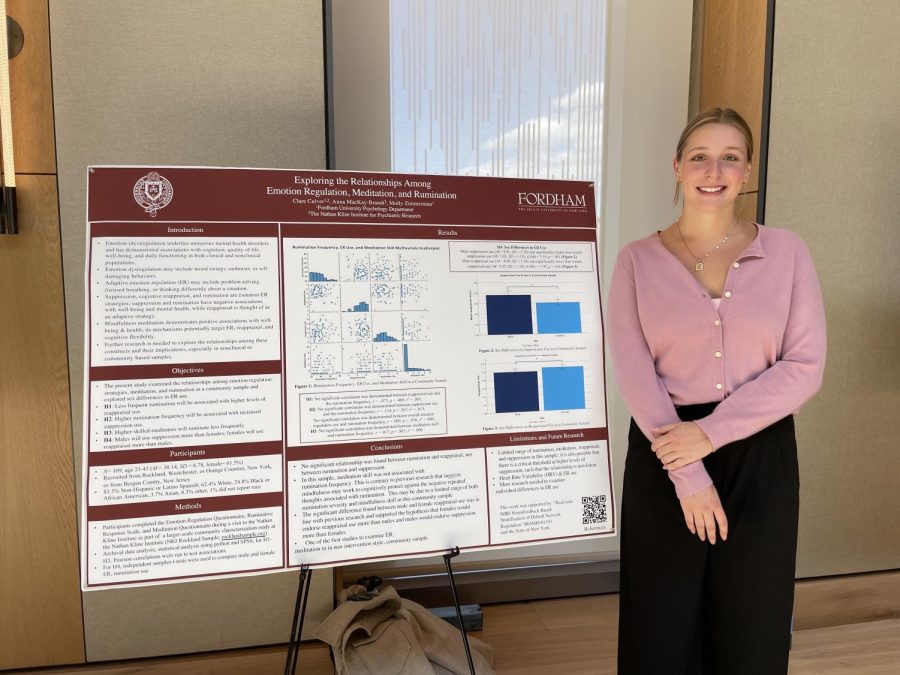Fordham Hosts 16th Annual Research Symposium
Fordham hosted its 16th annual undergraduate research symposium in an effort to showcase the research that Fordham students had been working on throughout the past year on Wednesday, April 19, 2023. “Originally, and still today, the symposium is inspired by our amazing students and their interest in engaging undergraduate research with faculty mentorship. It’s always been a way to celebrate them and showcase their work. It has grown a great deal over time and students from so many disciplines will be participants,” said Rachel Annunziato, who is a professor of psychology and associate dean for strategic initiatives for Fordham College at Rose Hill.
At its core, the symposium aims to help contribute to Fordham’s mission of cura personalis by allowing students to step out of their comfort zone in an attempt to make new discoveries, while simultaneously growing from the experience. “I have so many hopes that I cherish seeing come true,” said Annunziato.
“Our students are a part of such a wonderful community of researchers. It’s so helpful, too, for building analytical, communication and organizational skills that are important for many different career paths.” The symposium also attempts to act as an opportunity to work with others, develop leadership skills and learn to cooperate with those around them.
“There are also terrific opportunities like this to disseminate findings internally among supportive peers,” said Annunziato. “I see so many incredible discoveries being made by our students; the research they spearheaded and contribute to is deeply impactful.” Annunziato said her passion for the event stems from her own days as a college student. “I was a bit of a lost soul in college, but when I was introduced to research by a beloved professor and found how exciting and joyful it was, it gave me such a sense of purpose. I see so much of this too,” said Annuziato.
This year’s event was kicked off by slide presentations on the second floor of McShane. At 2 p.m. the event featured oral sessions on the third floor until 3:45. During the conference, students presented various interesting research topics and findings. Among the students were Anthony Lekakis, FCRH ’24, who conducted a 15-week research project in regards to legacy effects within plants such as the Japanese knotweed.
Another student, Sinaloa Burrja, FCRH ’22, conducted her research project in regards to the effect of ovarian hormones on regulating X-chromosome inactivation on the hypothalamus within mice. According to Sinaloa, “a significantly higher expression was found within the genes in OVX mice compared to naturally cycling animals when ovariectomy was done pre-pubertally, not not post-pubertally. Moreover, X-chromosome inactivation plays a role not only in biological but also in reproductive aging. Previous exposure to endogenous estrogen may also have a protective role in preventing major changes of X-chromosome inactivation due to ovariectomy.”
Della DeCola, FCRH ’26, conducted research on how poor mental health within adolescent years can affect a child’s academic ability later on in life. “Eighth-grade math achievement levels as ‘below basic’ percentage has increased from 27% in 2013 to 32% in 2022,” said DeCola. “At the same time, eighth-grade reading achievement levels as ‘below basic’ have increased from 23% in 2013 to 32% in 2022. Hence, showing a sharp decline in academic achievement due to poor mental health.”
As a whole, the program is meant to help nourish intellectual curiosity and spark interest and debate when new topics are being presented that some may find to be shocking or interesting. “I think our students learn a great deal about techniques germane to their disciplines, how to implement projects and explain/present findings to others. There are many different ways for students to get involved,” said Annunziato.
Further information about the program can be found through online information on the Fordham website, as well as through the symposium web page which contains more information about how students could get involved. According to Annunziato, students typically get involved through the Fordham College Rose Hill grant-funding network or university coursework. However, the symposium also has many students who connect with faculty in other ways that lead to research collaborations.
Details of previous symposiums can be found on the Fordham website.







































































































































































































